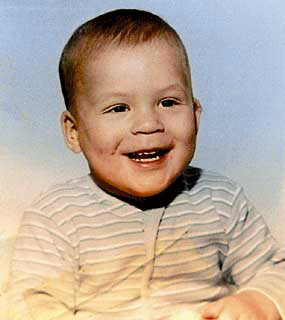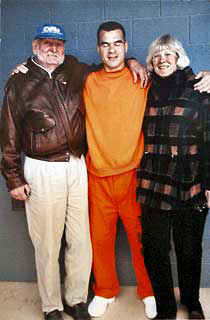 Katherine
Norgard knew there was something different about her little boy.
Katherine
Norgard knew there was something different about her little boy.
Tucson Citizen
Saturday, February 25, 2006
Alcohol:
a preventable crime
Mother details her pain and love for a
victimized baby who became a killer in adulthood.
GABRIELLE FIMBRES
gfimbres@tucsoncitizen.com
 Katherine
Norgard knew there was something different about her little boy.
Katherine
Norgard knew there was something different about her little boy.
He made the same mistakes over and over. Learning to read was a daunting task. And he stole, from other children and from her.
All the teaching, discipline and patience in the world did not seem to help Norgard's adopted son. The Tucson mother could not have known alcohol he was exposed to in the womb had left him with brain damage that would never go away.
And she never could have imagined the child she adored, John Eastlack, would grow up to be a killer.
Norgard, a Tucson psychologist, is the author of "Hard to Place: A Crime of Alcohol," (Recovery Resources Press, $14.95). The 184-page book, released last month, details her devastating journey after Eastlack, now 38, beat elderly Tucsonans Kathryn and Leicester Sherrill to death in 1989. Eastlack was on the run after escaping from prison, where he was serving a sentence for credit card theft when he committed the murders.
Norgard, 64, is on a mission to prevent other children from being born with fetal alcohol syndrome, the leading preventable cause of mental retardation in the United States. The syndrome and fetal alcohol spectrum disorders, occur when a mother drinks during pregnancy. Their children are left with impaired judgment and are robbed of the ability to lead normal lives.
The final line of the book explains Norgard's motivation: "My greatest hope is that no woman will drink alcohol if there is even a remote possibility that she is pregnant."
Eastlack's FAS condition remained undiagnosed until he was on Arizona's death row. Norgard spent eight years fighting his execution, and Eastlack's sentence was reversed in 1997, based partly on the diagnosis of his condition. He is expected to spend the rest of his life in prison.
His story starts in Minnesota in 1967, when his teen mother became pregnant. She drank as the baby grew inside her, and once was rushed to the hospital after blacking out.
 Because the baby was of mixed race, the girl's mother insisted she put him up
for adoption. He spent the next 15 months in 11 foster homes. One foster family
returned him because they wanted to go on vacation and did not want to be
burdened with a baby.
Because the baby was of mixed race, the girl's mother insisted she put him up
for adoption. He spent the next 15 months in 11 foster homes. One foster family
returned him because they wanted to go on vacation and did not want to be
burdened with a baby.
Norgard believes her son developed the grin he wore throughout his life, including his trial, as he moved from one foster home to another before he was adopted in 1969 by Norgard and her former husband, after they had daughter Sonda. Katherine married Don Norgard when John was in the fifth grade.
When she began writing "Hard to Place" in 1998, Norgard thought the book was about the death penalty. "But the real issue for me is the FAS," she said.
Teresa Kellerman, director of the FAS Community Resource Center in Tucson, called the book "an important story that needs to be told."
"Kathy's book shows devastation that can occur when FAS is not recognized."
The book starts with Norgard sitting at a stoplight as a radio announcer broke in with news that Eastlack was wanted for murdering the Sherrills, philanthropists in their 80s.
He was arrested in El Paso, Texas, after a story about the murders appeared on "America's Most Wanted." Eastlack confessed repeatedly to newspaper and television reporters as well as the judge. Conviction came quickly, amid intense media coverage.
 "Hard to Place" offers a rare glimpse into the wrenching experience
of the family of a convicted murderer. Norgard details how the crime forever
changed the lives of her, husband Don and daughter Sonda.
"Hard to Place" offers a rare glimpse into the wrenching experience
of the family of a convicted murderer. Norgard details how the crime forever
changed the lives of her, husband Don and daughter Sonda.
"I really lost my spiritual center," Katherine Norgard said. "Joy evaporated from my life. It was horrifying that someone I spent years with doing my best to raise to responsible adulthood could do such a terrible thing."
She became a tireless worker for Sanctity of Life: People Against Executions, and the Coalition of Arizonans to Abolish the Death Penalty. "It gave me something to do and a place to focus," she said. And it gave her hope that she could save her son's life.
Her work helped bring an end to the execution of the mentally retarded and juveniles in Arizona and the United States.
Norgard now dedicates herself to preventing FAS through education. She trains Tucson preschool teachers in working with children exposed to alcohol. And she works at Cottonwood de Tucson, an addiction treatment center, with teenage girls who are abusing substances and are sexually active.
Once a month, Katherine and Don Norgard make the drive to the state prison near Buckeye, to visit their son. Eastlack's sister, who lives in Colorado, visits him as well.
Katherine Norgard thinks often of the Sherrills.
"I wrote to their two sons," she said. "They seemed like very loving people. They've been in my thoughts a lot over the years."
She hopes if the two men one day read her book, it will help make sense of the terrible crime.
Writing has aided Norgard in reclaiming her life.
"I feel like Kathy again," she said. "I got joy back, and that's a really big thing."
IF YOU GO
Readings
Three readings and discussions with Katherine Norgard, author of "Hard to Place: A Crime of Alcohol" are scheduled:
• Monday: 6:30 p.m., Wingspan, 425 E. Seventh St., 624-1779
• Friday: 7 p.m., Antigone Books, 411 N. Fourth Ave., 792-3715
• March 25: 2 p.m., Mostly Books, 6208 E. Speedway Blvd., 571-0110
At each reading, "Hard to Place'' will be available for purchase for $14.95. It can also be purchased at FAS Arizona's Web site www.fasarizona.com.
On the Web
FASarizona.com: www.fasarizona.com
FAS Community Resource Center: www.come-over.to/FASCRC
National Organizationn on Fetal Alcohol Syndrome: www.nofas.org
Tucson Citizen FAS series: www.tucsoncitizen.com/projects/fas